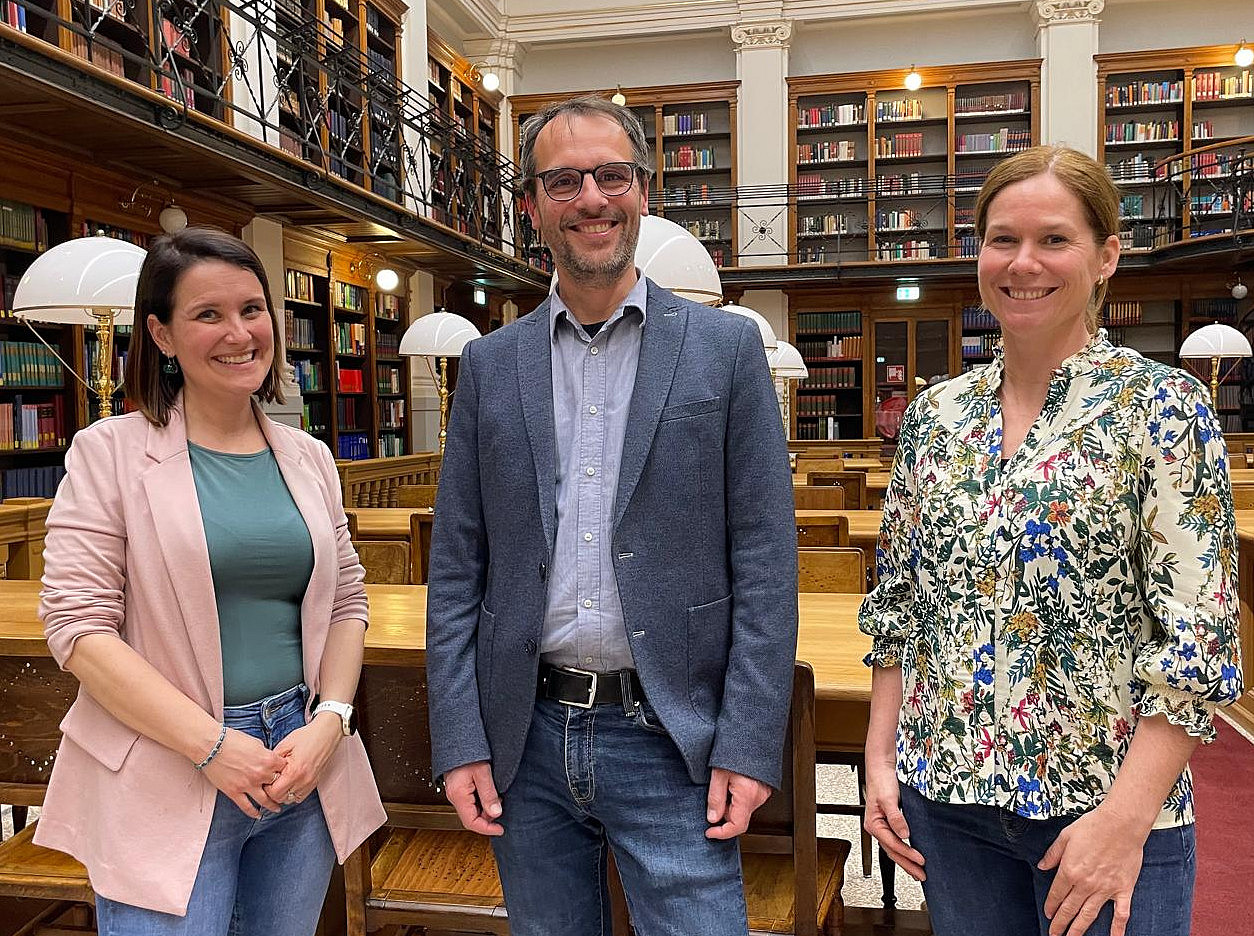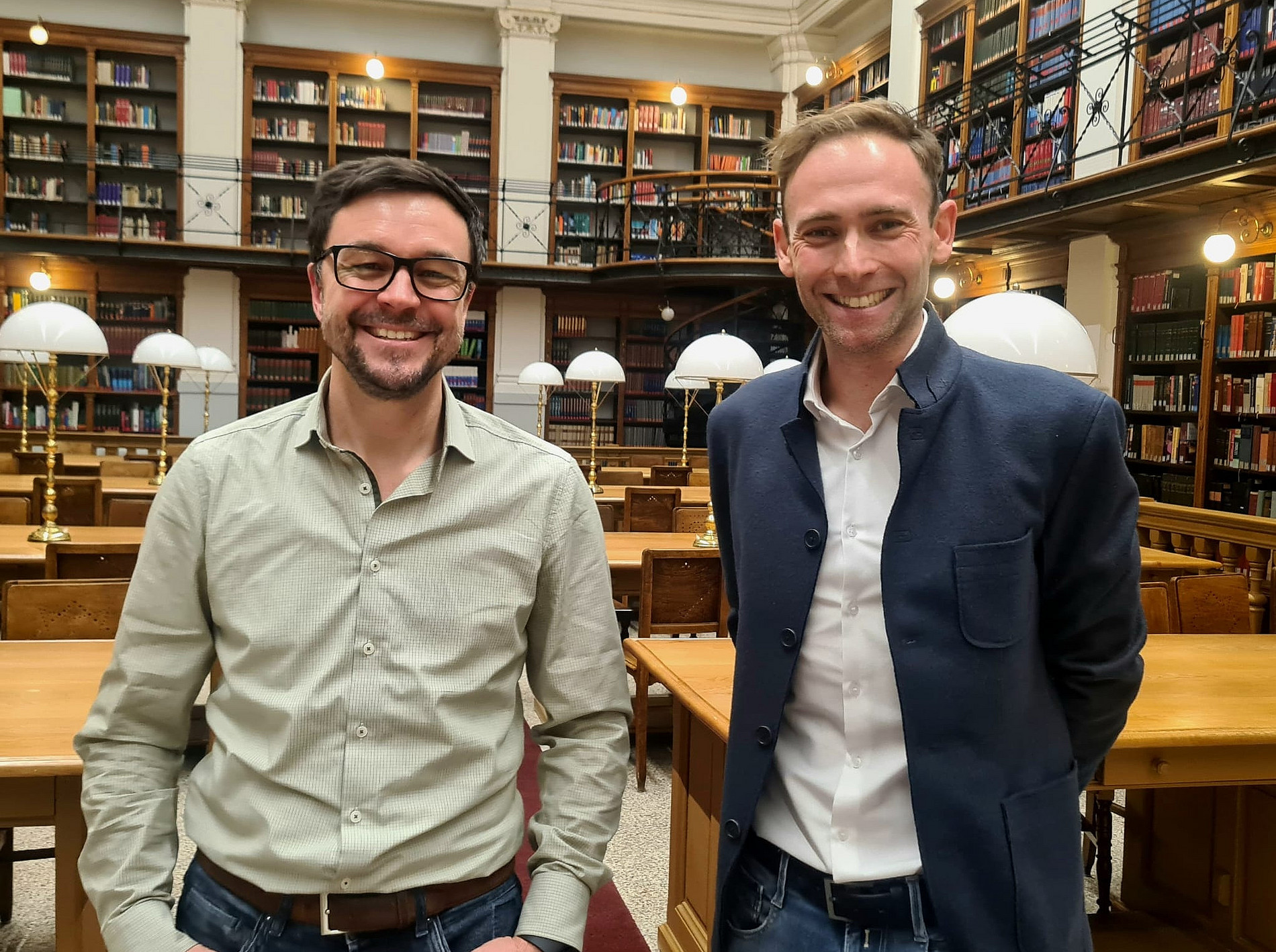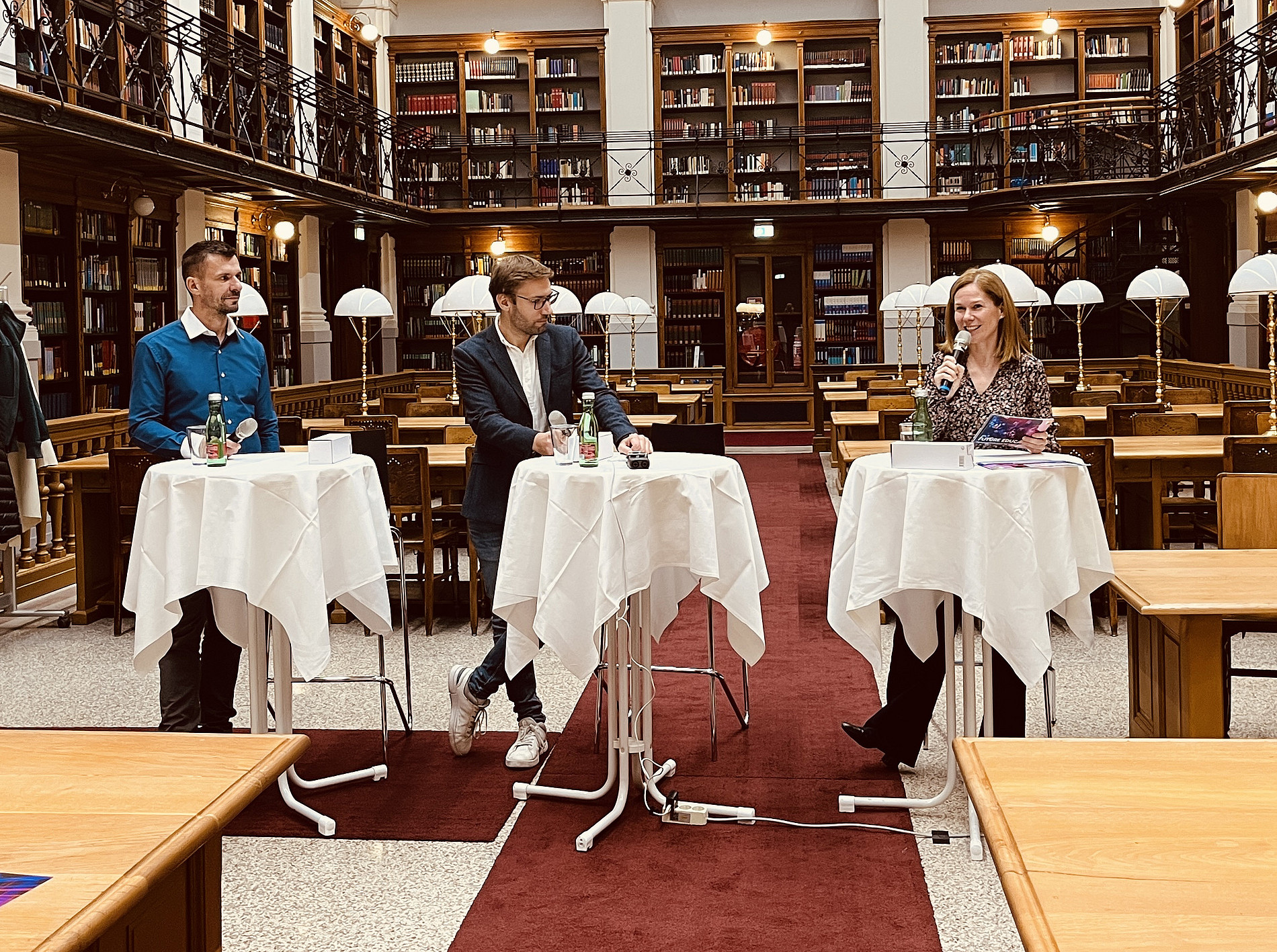Talks are organised on current topics from the field of education that affect and move researchers, educational partners and people interested in education in their professional and private lives. In these talks, we want to shed light on specific challenges in the field of education from different disciplinary perspectives in order to better understand phenomena and develop interdisciplinary solutions. The audience is invited to enter into a dialogue with the experts, ask questions and discuss points of view from different perspectives.
The event is free of charge. Please register via the online form! Thank you!
FUTURE EDUCATION Talk 3: "How new technologies are changing learning and performance"
Wednesday, 11 March 2026, 5 - 6 pm, Main Reading Room of the Graz University Library
In discussion:
- Aljoscha Neubauer, Psychologist, University of Graz
- Klaus Himpsl-Gutermann, Professional researcher, University College of Teacher Education Vienna
Moderation: Sonja Peitler-Hasewend
AI and generative AI are changing both learning processes and the way we deal with school and university performance - especially when it comes to exam design and academic writing. But what is the significance of prompting skills? And what challenges do AI agent systems pose - particularly in terms of their transparency and preparation for specific teaching scenarios? How will neuroenhancement techniques and transcranial electrical stimulation affect learning and performance? Psychologist Aljoscha Neubauer and professional researcher Klaus Himpsl-Gutermann discuss this in this talk.
FUTURE EDUCATION Talk 2: "How civic education can succeed in times of crisis"
Wednesday, 10 December 2025, 5 - 6 pm, Main Reading Room of Graz University Library (Universitätsplatz 3a/EG, 8010 Graz)
In discussion:
- Georg Marschnig, History didactician, University of Graz
- Robert Hummer, political didactician, Salzburg University of Education
Moderation: Sonja Peitler-Hasewend
Controversial political education is a central prerequisite for a functioning democracy. This is coming under increasing pressure - both as a way of life and as a system of rule - due to multiple crisis phenomena. What does it mean for political teaching and learning processes in schools when the foundations of democratic culture are increasingly being called into question? When conflicting opinions are no longer negotiated in constructive dialogue in view of the extreme polarisation of political disputes? When teachers are accused of manipulation when they deal with political issues in their lessons? The two history and political didactics experts Georg Marschnig and Robert Hummer address these and many other questions in this talk.
FUTURE EDUCATION Talk 1: "How video games support learning processes of the future"
Monday, 03 November 2025, 5 - 6 pm, Main Reading Room of the Graz University Library
The speakers will be:
- Manuel Ninaus, Psychologist, University of Graz
- Johanna Pirker, Computer Scientist, Graz University of Technology and Munich University of Technology
Moderation: Sonja Peitler-Hasewend
Video games are a popular leisure activity. At the same time, they can be innovative teaching and learning tools that are becoming increasingly important in education. At a time when artificial intelligence (AI) is taking over more and more tasks and important learning processes are sometimes not taking place as a result, it is crucial to clarify how video games function as teaching and learning tools. At best, they enable students to actively shape their learning processes and thus promote motivation - in addition to a critical examination of video games - instead of relying solely on AI-supported solutions. But how can video games be integrated well into lessons? What types of games are particularly suitable for this? And how can you recognise a high-quality educational game? Computer scientist Johanna Pirker and psychologist Manuel Ninaus address these and other questions in this talk.
FUTURE EDUCATION Talk 4: "How young people can help shape research"
Wednesday, 27 May 2026, 5 - 6 pm, Main Reading Room of the Graz University Library
In discussion:
- Angelika Bernsteiner, Science didactician, University of Graz
- Lilith G. Rüschenpöhler, Chemistry Didactician, NTNU - Norwegian University of Science and Technology
Moderation: Sonja Peitler-Hasewend
Research with young people is considered an exciting approach to promoting interest and participation in science. But how can research participation succeed in schools? And what forms of participatory research are there? In this talk, chemistry didactics expert Lilith Rüschenpöhler and science didactics expert Angelika Bernsteiner discuss how young people can be actively involved in research processes as part of citizen science and youth participatory science. The following questions will take centre stage: What makes research relevant for young people? How can research in the classroom be organised in such a way that it is not only technically sound but also truly participatory? What role do the interests and lifeworlds of young people play? And how can research and learning be combined?
FUTURE EDUCATION Talk 3: "How participation can succeed in the classroom"
Wednesday, April 2, 2025, 5-6 pm, Main Reading Room of the Graz University Library
In discussion:
- Lisa Paleczek, expert for inclusive education and psychology, University of Graz
- Sebastian Ruin, expert in movement and sports education, University of Graz
Moderation: Sonja Peitler-Hasewend
A claim to inclusive education, in which discrimination is avoided and all learners are enabled to participate in educational processes, has been articulated for school education in both legal and pedagogical terms. Nevertheless, numerous research findings from educational science, subject didactics and special educational needs research show that this claim often remains unfulfilled.
In this talk, Lisa Paleczek, from an educational science perspective, and Sebastian Ruin, from a sports education perspective, explore the question of how everyone can participate in lessons and how discrimination can be avoided.
FUTURE EDUCATION Talk 2: "How our brain learns to calculate"
Wednesday, January 22, 2025, 5-6 pm, Main Reading Room of the Graz University Library
In discussion:
- Stephan Vogel,Cognitive neuroscientist and psychologist, University of Graz
- Karl-Heinz Graß, mathematician and subject didactician, University College of Teacher Education Styria
Moderation: Sonja Peitler-Hasewend
How are certain areas of the brain responsible for understanding numbers and arithmetic? To what extent does learning mathematical concepts and intensive practice of arithmetic tasks change neuronal structures and functions in the brain? Why do some people find it easier to learn arithmetic? And what influence do neuroscientific research findings have on mathematics teaching? Neuroscientist Stephan Vogel and mathematician and didactician Karl-Heinz Graß address these and many other questions in this talk.
Listen to it again: Talk 2 - "How our brain learns to calculate"
How are certain areas of the brain responsible for understanding numbers and arithmetic? To what extent does learning mathematical concepts and intensively practising arithmetic tasks change neuronal structures and functions in the brain? Why do some people find it easier to learn arithmetic? And what influence do neuroscientific research findings have on maths teaching? Neuroscientist Stephan Vogel and mathematician and didactician Karl-Heinz Graß address these and many other questions in this talk.
FUTURE EDUCATION Talk 1: "How young people can protect themselves against fake news"
Monday, October 14, 5-6 p.m., Main Reading Room of the Graz University Library
In discussion:
- Stephan Schicker, language didactician, University of Graz
- Thomas Schubatzky, physics didactician, University of Innsbruck
Moderation: Sonja Peitler-Hasewend
The spread of misinformation is considered to be one of the greatest short-term threats worldwide. From an educational perspective, the question therefore arises as to how best to prepare learners to deal with misinformation. Didactic experts from various disciplines are addressing the following questions, among others: How can young people be sensitized to misinformation? How can strategies for checking and refuting false information best be taught? How can learners be "immunized" against fake news? The two panelists will try to find answers to these questions in this talk.



